Explainer: Why is round-the-world cruise of Iranian flotilla significant?
By Syed Zafar Mehdi
In a spectacular display of naval prowess in defiance of US sanctions and threats, the two-ship Iranian flotilla comprising the Moudge-class frigate Dena and Makran forward base ship returned home to a triumphant welcome on Sunday after a round-the-globe cruise.
Iranian Navy’s 86th flotilla sailed across the world, starting from the southern port city of Bandar Abbas on September 20 last year and cruising through the Indian Ocean, Pacific Ocean and Atlantic Ocean before heading back to the country’s shores following an epic voyage that lasted eight months.
The flotilla sailed through 65,000 kilometers of international waters and circumnavigated the globe.
The objective was to expand naval presence in international waters and send a message that the Iranian Navy will not be deterred by harsh sanctions and saber-rattling, according to officials.
It was the first-of-its-kind, round-the-world voyage undertaken by an Iranian Navy flotilla and came amid unprecedented sanctions and economic terrorism against the Islamic Republic.
As top Iranian military figures said at Sunday’s welcome ceremony in Bandar Abbas, the remarkable naval achievement proves the failure of US sanctions and the establishment of a new world order in which the Islamic Republic of Iran is a key global player.
What is the Iranian Navy 86th Flotilla?
The two-ship surface group comprises the indigenously-built Dena destroyer and Makran forward base ship. Dena is a Moudge-class frigate that joined the Iranian Navy’s fleet in June 2021.
Dena, manufactured with modern equipment and technology, is equipped with a wide range of defensive and attacking systems apart from its ability to navigate the seas and oceans for lengthy durations and the ability to search, detect, monitor and destroy hostile targets, say military experts.
It weighs about 1,300 to 1,500 tons and is approximately 94 meters long and 11 meters wide.
Dena comes with two surface-to-air missiles and four anti-tank missiles apart from 76 mm, 40 mm, 20 mm cannons and two 533 mm torpedo launchers respectively.
The destroyer is also equipped with four locally-made engines, each using 5,000 horsepower.
Makran, on the other hand, is the first and only forward base ship belonging to the Iranian Navy, named after a coastal region in southeastern Iran. It weighs about 121,000 tons.
The gigantic ship can carry 100,000 tons of fuel and food and other items and supply it to vessels in regional and international waters and can be deployed on a mission for 1,000 days without a port call.
It can also ferry fast boats and helicopters and has the capability to sail in free waters, engage with pirates and provide necessary support and security to Iran’s vast naval transportation fleet.
In response to Press TV correspondent’s question, the Chief of Staff of the Iranian armed forces, Major General Mohammad Bagheri, says the Iranian flotilla docked at 5 different ports despite US threats and that the US should accept that its losing power leverage on many… pic.twitter.com/XzhpvPymy4
— Highlights (@highlightsnews1) May 21, 2023
Where did the flotilla travel?
The 86th flotilla of the Iranian Navy embarked on the global cruise from Iran's southern port city of Bandar Abbas on September 20, 2022, and docked first at the port of Mumbai in western India.
The next stop was Jakarta in Indonesia, after sailing through the Bay of Bengal and the Strait of Malacca, a narrow stretch of water that connects the Andaman Sea with the South China Sea.
The two-ship flotilla continued the journey towards the Java Sea, a portion of the western Pacific Ocean, before sailing through the Makassar Strait and the Celebes Sea to its north and then arriving in the Pacific Ocean. It was the first time an Iranian flotilla dived into this mammoth body of water.
Cruising through the length and breadth of the Pacific Ocean, the flotilla passed by the islands of Micronesia and Polynesia before heading to the Strait of Magellan in southern Chile, which is described as an important natural passage between the Atlantic and Pacific oceans.
The Iranian ships then sailed into the southern part of the Atlantic Ocean and brushed past the coasts of Chile, Argentina, Uruguay and Brazil before arriving at the port of Rio de Janeiro in Brazil. It coincided with the 120th anniversary of the establishment of diplomatic relations between Iran and Brazil.
After docking at the Brazilian port for a few days, which raised eyebrows in the US, the squadron sailed through the Atlantic Ocean and reached the South African port city of Cape Town.
On the way back, it docked at the port of Salalah in Oman before sailing into Iran’s territorial waters a few days ago, covering some 65,000 kilometers for eight months and crossing the equator four times.
Iranian Navy’s 86th flotilla completes mission after round-the-world voyage pic.twitter.com/CGUrSDi4vq
— Press TV (@PressTV) May 18, 2023
What is this mission significant?
The epoch-making naval mission came amid the harshest sanctions and saber-rattling with the US Treasury in February sanctioning the two ships while they were on the international voyage.
Last week, when the flotilla was berthed at Oman’s Salalah port, Iran’s navy commander Rear Admiral Shahram Irani said the US failed to prevent the Iranian naval squadron from sailing through the Panama Canal, an 82-km waterway in Panama that connects the Atlantic Pacific oceans
He said the “global arrogance” tried to block the Iranian flotilla’s mission through threats and sanctions, but the successful voyage marked “another slap on the face of the Great Satan”.
The navy commander also said that France claimed the Iranian ships had entered its waters but the French authorities turned mute when they were reminded of their own shipping rules and regulations.
In recent years, Iran’s naval forces have expanded their presence in international waters to protect shipping routes and provide security for merchant vessels and tankers.
It has regularly carried out patrols in the Gulf of Aden and the Indian Ocean to fight piracy and secure vessels owned or leased by Iran or other countries. At times, it has had to warn US vessels too.
Several attacks on Iranian or foreign vessels have been thwarted by the Iranian Navy in recent years, with the assurance that its military prowess must be seen as a source of naval security, not tension.
In August last year, Shahrami said Iran’s Navy is fully prepared to conduct operations in oceans across the globe. Before that, in June, he said the country's naval forces were fully prepared to defend Iran’s interests and confront any external threat anywhere.
"If enemies threaten the security of the country, Iranian Navy forces will respond to their malicious acts harshly," he was quoted as saying at the time, in a blunt and powerful message to enemies.
The historic voyage by the 86th flotilla not only displayed Iran’s maritime capabilities but drove home the point that the language of threat and force does not work with Iran as it is committed to asserting its strength in international waters and providing security to its vessels.
Iran has officially welcomed the Navy’s 86th flotilla crew members in a ceremony with the presence of Chief of Staff of the Iranian Armed Forces Major General Mohammad Baqeri in the port city of Bandar Abbas.
— Press TV (@PressTV) May 21, 2023
Follow Press TV on Telegram: https://t.co/B3zXG73Jym pic.twitter.com/WBttNuJ1wt
How did the world react?
The historic naval mission grabbed headlines across the world, especially in the US, with a US Department of State spokesman telling Fox News in February that they “continue to monitor Iran’s attempts to have a military presence in the Western Hemisphere."
In March, when the Iranian flotilla was docked at Rio de Janeiro port, US Assistant Secretary of State for Western Hemisphere Affairs Brian Nichols expressed concern over Iran’s growing naval reach.
"The sovereign decision of Brazil to allow the Makran and the Dena to dock in February and their subsequent departure on March 4 is deeply disappointing," he told the US senate foreign relations committee, adding that the Iranian ships have “have no place in our hemisphere”.
US ambassador in Brazil Elizabeth Bagley even made a passionate appeal to the Brazilian government to not allow the Iranian naval ships to dock in Rio, but the appeal were bluntly dismissed.
Hawkish US senator from Texas Ted Cruz remarked that allowing Iranian warships to dock in Brazil "was “a dangerous development and a direct threat to the safety and security of Americans."
“The Biden administration is obligated to impose relevant sanctions, reevaluate Brazil’s cooperation with US antiterrorism efforts, and reexamine whether Brazil is maintaining effective antiterrorism measures at its ports,” he was quoted as saying in early March.
Last month, the Israeli regime’s foreign ministry spokesman Lior Haiat in a Twitter post said the regime views the docking of Iranian hips in Brazil “as a dangerous and regrettable development”.
The cruise of the Iranian flotilla even prompted the Israeli regime’s top military figure and other officials to travel to Washington and discuss what they saw as an Iranian “threat”.
Iranian Navy’s 86th flotilla back home after completing landmark round the world trip
— Press TV (@PressTV) May 21, 2023
Follow Press TV on Telegram: https://t.co/B3zXG73Jym pic.twitter.com/EIyXaLyxOZ
What did Iranian officials say?
Leader of the Islamic Revolution Ayatollah Seyyed Ali Khamenei felicitated the Iranian nation following the heroic return of the 86th flotilla, commending the “brave men” on the path-breaking feat.
“I extend my congratulations to the brave men of the 86th flotilla of the Islamic Republic of Iran’s Navy on their grand and successful naval mission. Dear ones, welcome back home, and may you be successful,” he said in his message on Saturday.
Iran’s parliament speaker Baqer Qalibaf also issued a congratulatory message, describing the successful mission as “a matter of prestige, honor and happiness” for the Iranian nation.
He said the voyage displayed the powerful presence of Iranian forces in international waters and proved to the world that Iranians will always emerge victorious in accomplishing important missions.
Iran’s foreign ministry spokesman Nasser Kanaani in a separate statement hailed the feat, saying it happened for the first time in Iran’s history that indigenous ships circumnavigated the globe.
"In this great mission, Iran showed that the oppressive and unilateral sanctions imposed by the US can be defeated. It also increased hope in the hearts of the independent nations of the world," he noted.
The chief of staff of the Iranian armed forces Major General Mohammad Bagheri in his remarks on Sunday during the welcome ceremony in the port city of Bandar Abbas said the country is poised to become a “great maritime power” in the country.
Reiterating the commitment of Iranian armed forces to maintain their presence in the local and international waters, he said “We do not need foreigners to secure the region."
Answering a question from a Press TV reporter in Bandar Abbas, the top military official said the flotilla docked at five different ports across the world despite US threats.
Last week, following his visit to Tehran, the commander of the Russia Navy Nikolai Yevmenov said only a "superpower country" can accomplish the mission of sailing around the world on naval vessels, commending the Iranian Navy.
US-Israeli aggression left Tehran with no choice but to defend Itself: President Pezeshkian
Iran urges immediate intl. action against US attacks on schools
Iraq won’t allow terror groups to cross border into Iran: Security official
Iran’s security chief: Does America come first or Israel with 500 US soldiers killed?
Iran warns all Israeli embassies ‘legitimate targets’ if Lebanon embassy attacked
IRGC pounds bases of anti-Iran terrorist groups in Iraqi Kurdistan
Iran’s Fattah 2 hypersonic missile nearly impossible to intercept: Report
Another girls’ school targeted in US-Israeli attacks on Iran


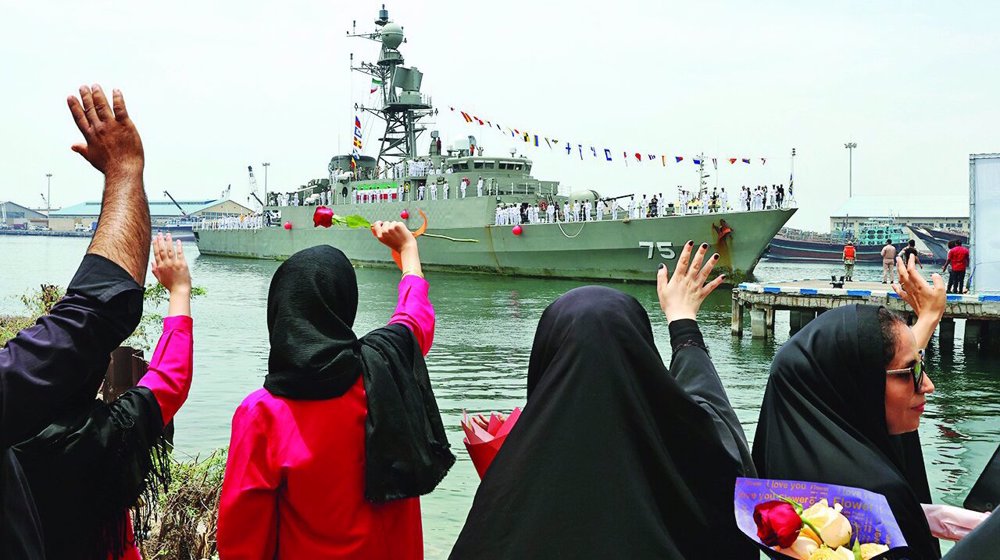

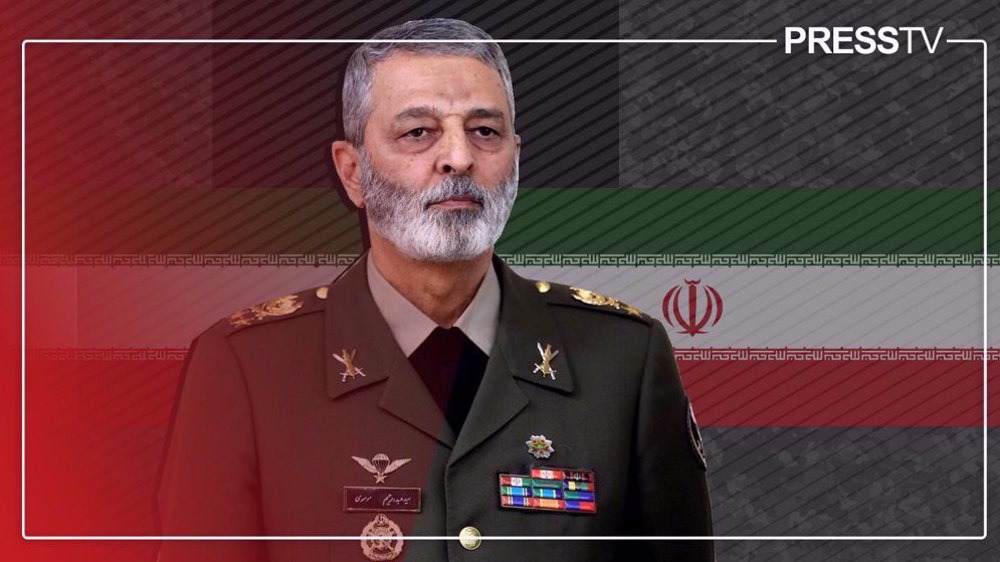
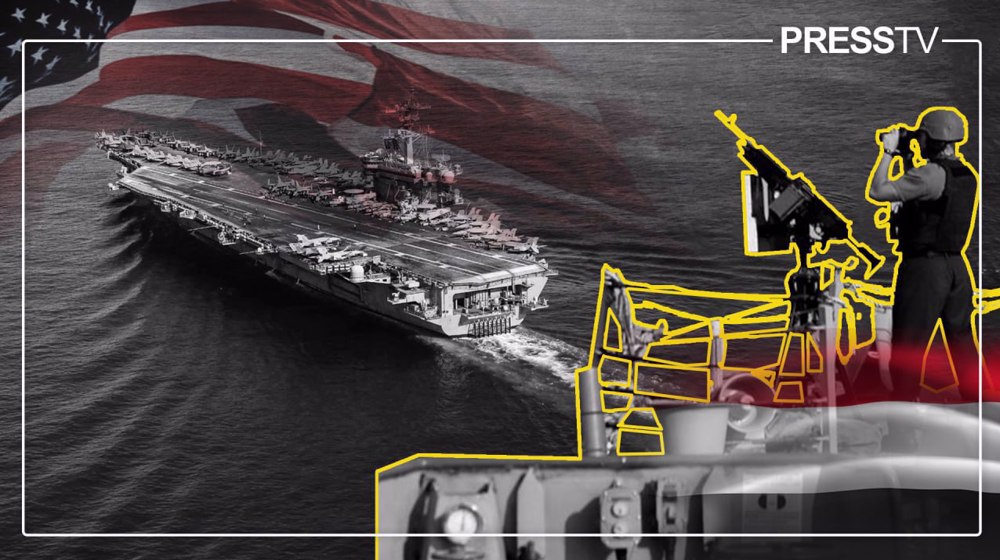



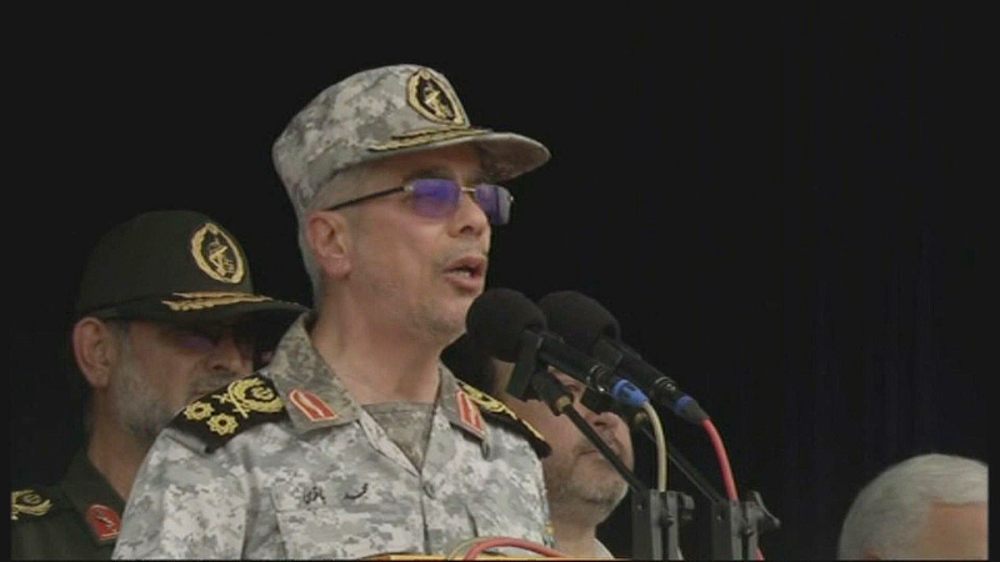

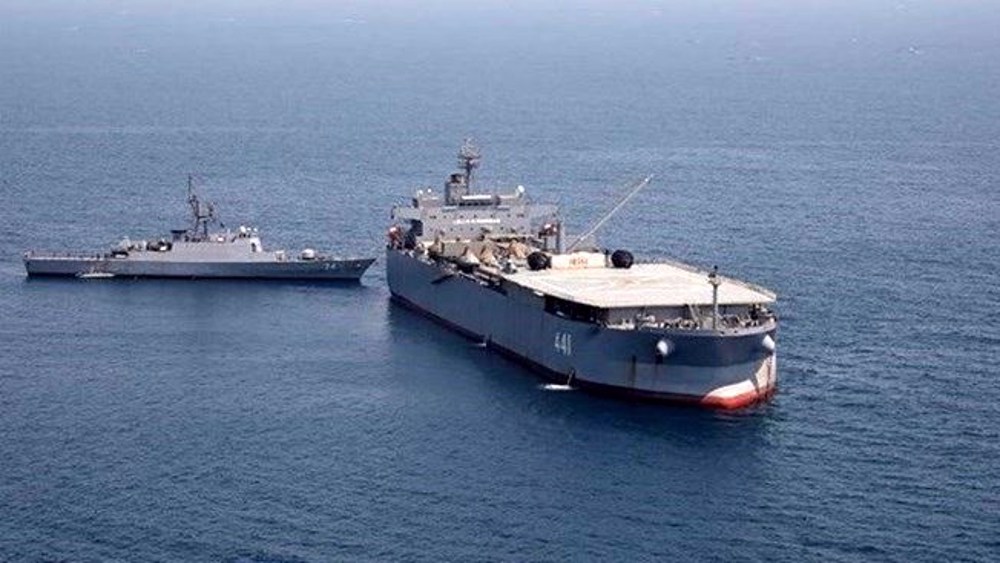



 This makes it easy to access the Press TV website
This makes it easy to access the Press TV website